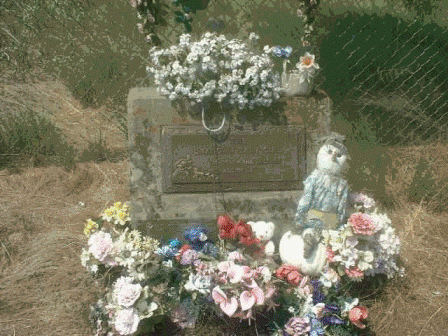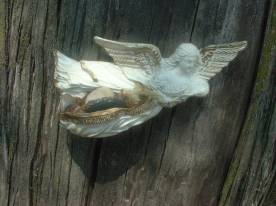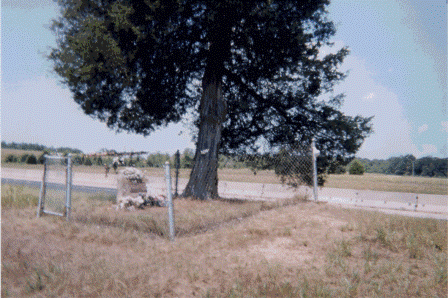



--photos by Gerald Torrence, 2000
By W.E. ORR
White County Historical Society President, 1963-64
The way of a historian is hard. It is the same even though your efforts only center around a family, a town or a county. Just when you think that you have heard every story, pursued every bit of folklore to its source, followed up every legal record -- then it is that you discover new evidence of still further frontiers. So it was with the "Highway Roadside Mystery Grave" which I first began to hear of in July 1977, when I was editor of the White County Record, Judsoniaís newspaper. Our first news story advised our readers that "If you turn right from Highway 157 to the new freeway, you will find a mini-park, surrounded by a fence and shaded by what is probably the only tree left in the four-lane highway complex. A great many drivers have wondered, as they drive eastward, what the purpose of this oddity could be.
The fence surrounds the grave of an unknown child. When the engineers were running their surveys, they were told of this isolated burial spot. That highway departments have hearts was thoroughly demonstrated. The grave was marked and protected. Of course, there are different stories. Some say that the grave was dug for the child of a poverty-stricken family, who could afford no better resting-place for their child. Others say that a party of Indians came this way years ago, and left behind the little tribal princess who died in Judsonia.
We had most of the details of the solutions in order by the time of the next edition. The second story, July 14, 1977, read:
"Judsoniaís mystery grave," featured on the front page of the July 6 edition, is the grave of a baby girl, not quite two years old, who died in a high-chair accident sometime around the years 1890 or 1891. Dee Hopper of Rt. 1 Judsonia says that the mound has been there as long as he can remember, and that he heard the story of its origin from older members of his family.
According to Mr. Hopperís information, the child died of a knife wound, which she received when her high chair tipped over. In some manner, the baby had taken a large knife from the table near which her chair had been placed. Then, by shoving against the table, she managed to overturn the rickety chair. The knife plunged into her chest when she fell to the floor.
Her family were tenants on the farm. They were very poor and could not afford to have their child buried in Evergreen Cemetery, which had been in use for approximately 16 years at the time of her death. The owner of the farm at that time was a man by the name of Bunte. His land adjoined that of Mr. Hopperís parents, Jesse Hopper and Clara Ann Smith Hopper. With the help of neighbors and friends a crude casket was constructed and the babyís body was buried in a fence corner. Later, adjustments were made in the property lines, and the grave was found to be within the Hopper holdings.
Among those who attended the childís funeral was Mrs. Callie Huff, a long-time resident here. Mrs. Huff often told of the circumstances surrounding the death of the baby and described the scene at the funeral. Dee Hopperís mother, aunts and uncles made a sort of a woodland shrine out of the little mound and put flowers, which grew wild in profusion in that part of White County.
Hopper has reasons to believe that the babyís name was "Cousins". Years ago, after hearing the tale once more, he jotted down the name on an old ledger. The years went by, and he had half forgotten the incident when he discovered the name "Cousins" in his own handwriting. He has no clue to her first name.
When surveys were being made for the new highway in 1965, Mr. Hopper took the information that he had to Arkansas Highway Department officials. At that time, it seemed improbable that the new four-lane complex would follow the route to which it was eventually assigned. Later the favored route surveys showed that near Bald Knob, the highway would have to pass through a multi-grave cemetery, which would present insurmountable problems. The engineers then chose the present route, and the small grave fell within the highway departmentís jurisdiction. The fence was erected, a tree was allowed to remain at the side of the mound and the small grave remains today in full sight of the thousands of motorists who pass along the two concrete ribbons.
TheRecord said last week that "Some say that the grave was dug for the child of a poverty-stricken family. Others say that a party of Indians came this way years ago, and left behind the little Indian princess who died here." In all traditions, there is generally some basis of fact, but Mrs. Martha Wright tells theRecord that even though there really was an Indian princess, she is definitely not buried in the Highway 64 mini-graveyard. Mrs. Wright remembers this incident well.
It was years ago that a migrant party of Indians carne to the home of Dr. S. H. Burkhausen near here. Dr. Burkhausen was the father of Mrs. Wright. "We need a white manís doctor," they told Martha. "The little girl is very sick. She is a princess, you know."
Mrs. Wright placed her hand on the childís forehead. It was hot with the high fever. The doctorís daughter placed a towel soaked in cold water on the little girlís head, and explained to the Indians that her father was not at home. "You do need a doctor," she told them. "Take her to Judsonia right now."
The Indians went on, and camped on the outskirts of town. That night the little Indian princess died. Either secretly or with permission, the Indians took the small body to a spot just outside the northern boundary of Evergreen Cemetery, and buried it there. It was the third day of July.
For years afterward those who started down Judson Avenue to the Independence Day celebration grounds in the City Park saw a stranger sight than anything they were to see on the midway. The Indians had returned again and they were performing their ancient ceremonials around the mound. First one and then another would perform a slow, rhythmic dance around the grave, chanting in monotone. Those who passed by watched in wonder.
Mrs. Wright believes that a large stone may still mark the gravesite, but the lot is covered with heavy brush now. The Indians stopped coming back many, many years ago.
One wonders how many unknown graves of all three races -- Red, Black and White --mark a trail of tears that has led America to this year of 1977. There must be a great many of them and it would seem that Judsonia has had its share."
An editorial also appeared in the July 14, 1972, issue. It read in part: "Even with the additional data revealed in todayísRecord columns, the child remains unknown. In a sense, then, she belongs to all of us--to parents who can translate her early death into the worst of their fears; to those who are without children; to those who remember when their own offspring were toddlers and to each and every one of us who holds fast to our earliest memories of those happy days when we, too, gazed around in wonder at a world that was much too big for us."
It would seem to be fitting that Judsonia adopt this baby. She should have a gravestone with a marker that will tell her story and flowers in profusion to symbolize the happiness that she had so little opportunity to enjoy.
Hundreds of motorists pass the site every day. Perhaps, as her story becomes known, Judsonia can help all America renew its dedication to the welfare of children everywhere. After all, she belongs to all of us now!
Some of it, at least, has come true. Mayor Bill Stutt ís administration became interested in the project, Louis Harris designed and constructed a concrete tombstone and flowers mysteriously appear on the mound The markerís inscription reads:
"The Unknown Baby Girl
In death she belongs to all of us."
(W.E. Orr was a charter member of the White County Historical Society. He died May 30, 1997 at age 86.)
The gravesite was checked July 12, 2000, by Historical Society member Leroy Blair, who reported "The grave now has a very nice stone with several flowers planted. On a tree beside the grave is a figurine of an angel." The grave is located in the triangle formed when the northbound lanes of Highway 67/167 and Highway 157 merge.

--photo by Leroy Blair, 2000